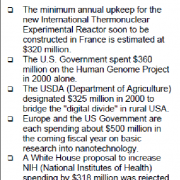Seedy Solutions in Switzerland?
Submitted by ETC Staff on
The Biosafety protocol on GM crops was a big thing in January, but the meeting about to begin in Neuchatel addresses a 'clear and present danger' to world food security. A brave little band of 'biocrats' could decide the fate of the scientific exchange of crop genetics. Their political bosses don't even know they've left town!
The Biosafety deal struck by governments in Montreal in January was intended to make the world safe from (or for?) transgenic crops. But what about the safety of those pedestrian seeds that are the basis for virtually all genetic crop improvement? The stuff that lets bio-engineers juggle genes and allows farmers to breed new diversity that can meet the stresses coming with global warming? Whereas the biosafety protocol tries to prevent the unwanted movement of GM seeds around the world, another treaty is being developed to facilitate the exchange of seeds for scientific research.

